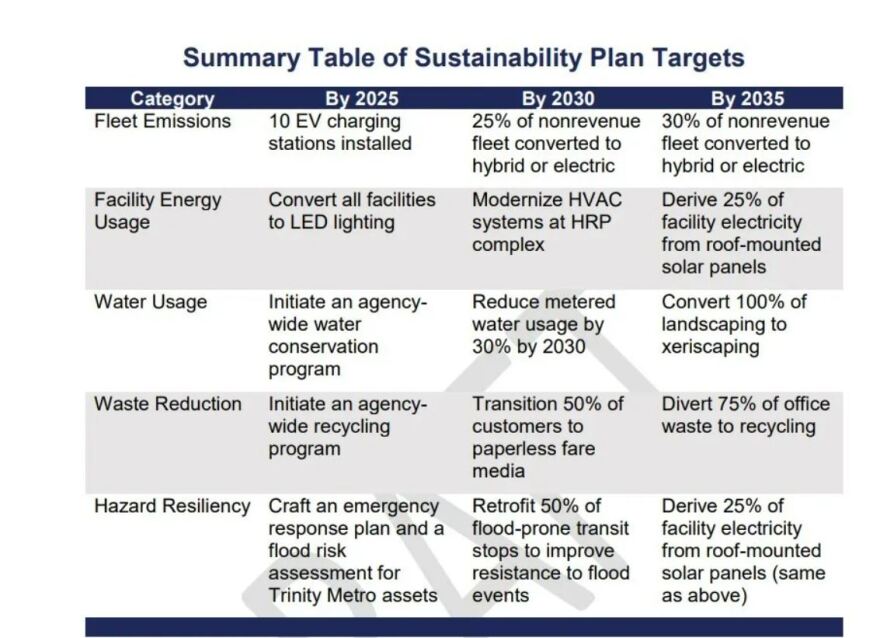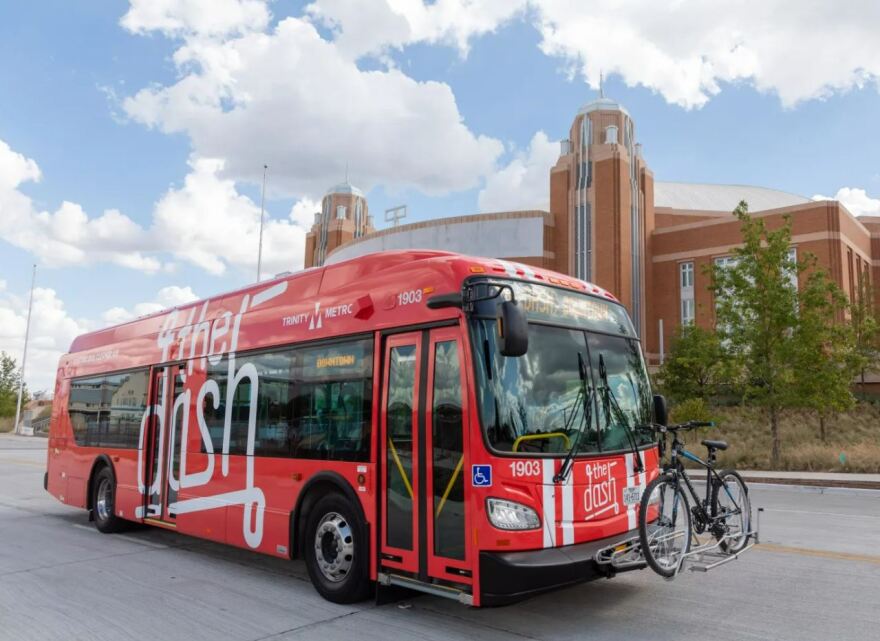Six carry passengers through downtown and the Cultural District. Over the past decade, the agency’s fleet of buses were converted from a diesel fuel system to compressed natural gas in an effort to reduce fossil fuel emissions.
But those initiatives were never compiled into a formal action plan with timelines for completion that could be viewed by employees and the general public, Edwards said.
Now, thanks to the agency’s participation in the Federal Transit Administration’s inaugural “,” staff have drafted their first-ever .
“We already do a lot of these things – it just hasn’t been documented very well,” Edwards said. “We already have electric buses and the plan is to purchase more of those. It just wasn’t put on paper, necessarily, that we were going to do this in a certain timeframe.”
Trinity Metro is one of participating in the challenge nationwide. The goal is to push public transportation agencies to further reduce , which trap heat and contribute to global warming. Transportation accounts for 29% of total greenhouse gas emissions each year, according to the .
The , a voluntary association of governments that work on regional planning issues, encouraged local transit agencies to get involved with the challenge. Dallas Area Rapid Transit, Denton County Transportation Authority, east Dallas’ STAR Transit and the council of governments are also participating.
Organizations had a slate of three options: submitting their existing climate action plans, explaining their strategy for developing one or creating an entirely new plan for the challenge, Edwards said.
“It gives us a better sense of how we move forward in the future, and it’s still in its early stages,” Edwards said. “There’s some internal review that has to be done, but we hope to take it to the board (of directors).”
Lori Clark, an air quality program manager for the council of governments, offered support to agencies regarding the different strategies they could use to transition their fleets to cleaner fuel sources, whether through pursuing federal grant funding to purchase electric buses or improving energy efficiency at their facilities.
Clark also leads the program, which the U.S. Department of Energy established in 1995 to help local governments reduce fossil fuel consumption.
“Our fleets were very early adopters in making that switch to natural gas and getting into cleaner fuels,” Clark said. “Now they’re going to be early adopters to making that additional switch from natural gas to even cleaner electricity. It’s got the same benefits in terms of reducing ozone-forming pollutants, with the extra benefit of being even more impactful in terms of greenhouse gasses.”
Under the Biden administration, federal funding to transition bus fleets to electric vehicles has increased ten-fold, Clark said. The two central sources are the and the , both overseen by the Federal Transit Administration.
“That’s where a lot of our transit agencies, not only here but around the country, have been able to get funding to help acquire their very first electric buses because they are so much more expensive,” Clark said. “I’m sure that there’s plans to send in more electric bus applications.”

Trinity Metro’s draft sustainability plan, submitted prior to the April 15 deadline, focuses on five key areas: emissions from its vehicle fleet, facility energy usage, water usage, waste reduction and preparation for floods and natural disasters.
By 2025, Trinity Metro plans to install 10 electric vehicle charging stations, initiate agencywide conservation and recycling programs, and create an emergency response plan and flood risk assessment for their fleet, among other goals. Long-term plans include converting 30% of staff vehicles – the “non-revenue fleet” of vehicles – to hybrid or electric by 2035.
Challenges to converting all Trinity Metro buses to electric include the capacity of the local electric grid to recharge buses, Edwards said. Another concern is how long the buses can run without being charged.
“What is the infrastructure there on the electric grid that can provide that charging capability?” Edwards said. “What do we do with the buses – do we bring them back to the garage to charge or is there an opportunity around to charge them? How often do they have to recharge? These are all considerations that we have when we’re thinking about this.”
For now, Edwards is happy to highlight the actions Trinity Metro is already taking to reduce air pollution in Tarrant County. At for Earth Day on April 22, 10 transit agencies from across the country will be celebrated for their “exemplary efforts” to address emissions.
“We’ve had a hard time patting ourselves on the back for all the good things we’re doing,” Edwards said. “We’ve already renovated downtown and taken on a 110 year-old building remodel inside with water-saving measures. We are really trying to get LED lights in the whole office. We’re always looking at opportunities to improve our footprint.”


